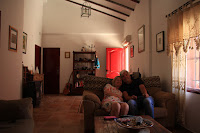Searching for authentic

There are lots of Western Europeans, other than Spaniards, in Pinoso. In fact there seem, without knowing the figures, to be more and more. Belgian and Dutch voices are much more evident now than they were a little while ago and there is a good smattering of German and French in the supermarket too. Obviously enough there are other nationalities hoping to carve out a better life and, recently, there has been an influx of Ukrainians but those people have different stories. The Belgians, Germans and Swedes are here, generally, by choice. They may or may not be resident. Signed up Europeans, not the ones who rant about secure borders, have rights in Spain. They can come and go more or less at will, so determining who is and who isn't resident can be quite tricky. As it used to be with Britons. A question I have been asked lots of times by Spaniards is why so many Britons choose to live in Pinoso. I've never been able to think of a good response. I can't now. Part of it must b...











